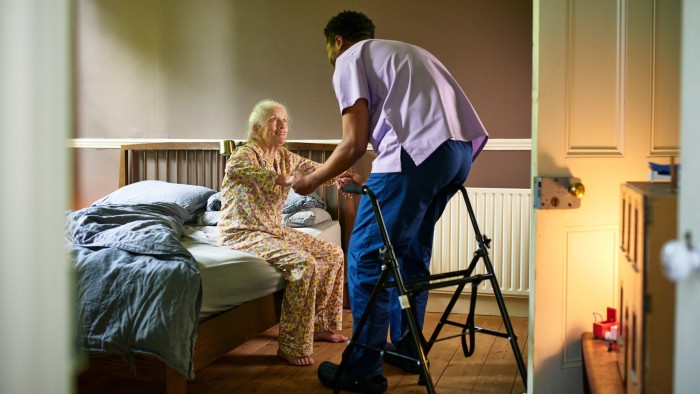Stay informed with free updates
Simply sign up to the UK employment myFT Digest — delivered directly to your inbox.
It is no secret that Britain’s relatively lightly regulated labour market is about to enter a new era, with a series of extra rules on their way. But in my view, the most radical impending change has so far received the least attention: the Labour government’s plan to introduce sectoral collective bargaining to an important sector of the economy.
Employer and union representatives will be expected to sit down and negotiate new rules on minimum pay and conditions for care workers by 2028 — a so-called “fair pay agreement”, which will be legally binding across the sector.
This way of setting pay is commonplace in much of continental Europe and Scandinavia, but the UK hasn’t had much experience of it since the 1970s. And social care is not exactly a small or low-stakes sandbox in which to experiment: roughly 18,000 organisations employ more than 1.5mn people in the sector in England. So why do it, and will it work?
It’s clear that the sector cannot go on as it is. As the population ages, there will be a need for roughly 440,000 more posts by 2035 to sustain current levels of service, according to estimates by sector body Skills for Care. Yet employers struggle to recruit and retain enough people already. These are demanding jobs, yet pay remains close to the minimum wage and conditions are poor. Immigration plugged the gaps for a few years but that led to (entirely predictable) exploitation of migrant workers, and the government has now said it will put a stop to overseas recruitment.
In a normal market economy, employers faced with chronic recruitment issues would raise pay and conditions. But adult social care is not a normal market: most of it is state-funded, predominantly through local authorities. And local authorities have so little money they say they cannot afford to raise the fees they pay to providers.
Given that, you might reasonably conclude that the answer is simply to put more government money into a cash-starved system. Yes, say unions and the government, but on its own that might not be enough: without legally binding rules that raise pay and improve conditions, there would be no guarantee that giving extra money to providers would filter down to the workforce. A cash-strapped care home might spend it on residents’ meals, for example, or a firm run by private equity might pocket it in profits.
There is precedent: the government injected about £600mn into the system during the Covid-19 pandemic, which was supposed to help care providers pay their staff their normal wages when they had to isolate. But unions reported that many workers continued to drop down to statutory sick pay.
There is a case for intervention, then. But is collective bargaining the way to do it? Evidence from the OECD suggests the devil is in the details: sectoral collective bargaining can lead to better productivity, or it can become sclerotic if it doesn’t leave scope for some bargaining at the company level too. Done well — as in Scandinavia, for example — it can provide employers with a lot more say over regulation than if they were ruled by government diktat. “There is a view in the UK that I’ve certainly heard from politicians — even sympathetic politicians — that by establishing social dialogue you make it harder and less flexible for employers,” Melanie Simms, professor of work and employment at Glasgow university, told me. “It’s a real misconception.”
But it isn’t easy to pull off a change of direction and make it stick. In New Zealand, for example, a five-year settlement was agreed between government, unions and health boards in the sector that involved ringfenced government money to establish a pay scale linked to qualifications and length of service. But the plan didn’t become part of the fabric of things: after a change of government, the settlement was left to expire.
For Labour’s “fair pay agreement” to have a longer shelf-life, it will need to be able to demonstrate two things: that employers and unions can sit down and negotiate a reasonable plan, and that the government is willing to inject sufficient funding to actually make it work. Last week, health secretary Wes Streeting announced a “down payment” of £500mn towards the first agreement, which will be nowhere near enough: spread evenly between the 1.5mn workers in the sector, it would amount to roughly 20p extra per hour each, according to The Health Foundation.
I think there is a good case for sectoral bargaining in social care. But if the government tries to implement a big change like this on the cheap, it might end up looking like a failure, whether or not it was a good idea.

